This week, we continued the Exodus story and tried to empathize with our main characters, Moshe, Yocheved (Moshe’s birth mother), Miriam (Moshe’s biological sister), Batya (Pharaoh daughter and Moshe’s adoptive mother), and Pharaoh.
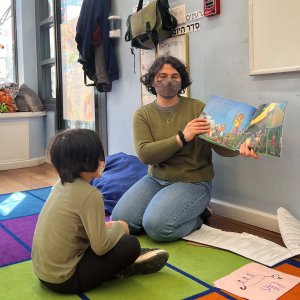
Garinim (kindergartners) love this story. Everyday, when we pause the narrative, they shout and want to hear more! Here’s some of what we unpacked last week.
There was a couple, Yocheved and Amram, who had a baby boy. They hid him for three months so Pharaoh couldn’t have him thrown into the Nile. Then, when they couldn’t hide him any longer, Yocheved sealed a basket with tar, put the baby inside, and left him hidden in the reeds along the Nile under his sister Miriam’s watchful eye. Batya, Pharaoh’s daughter, found the basket and saved the baby, whom she named Moshe. (Exodus 2:1-10)
Imagine you’re Yocheved. What are you thinking and feeling when you choose to put your baby in the Nile river?
- It sounds sad and disappointing for Yocheved to not be able to keep her baby.
- Sad and angry.
- Scared – what if an animal eats the baby.
- Uncertain. We know he ends up okay but she doesn’t know that.
- Even though putting the baby into the Nile isn’t safe, it still seems better than just letting the Mitzrim (Egyptians) kill him.
This story has lots of important women characters. How would you describe them?
- Yocheved is brave even though she’s scared.
- Miriam never gives up.
- Miriam is kind and helpful.
- Batya is kind for saving the baby even though she knew he was an Ivri.
- Batya is disobedient, but like in a good way. She does the right thing even when it’s hard.
Who are the women in your life who are similar to Batya, Yocheved, and Miriam?
- You! (Gaby)
- My mom.
- My grandma.
- The characters in this story! We know them now because you just taught us about them.
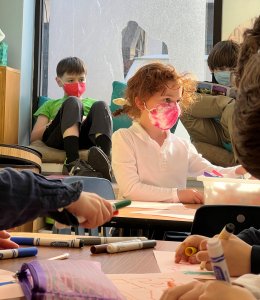
Moshe grows up more, and one day notices a Mitzri taskmaster beating an Ivri (Hebrew) slave. He looks around, and, seeing no one about, hits down the taskmaster and kills him (Exodus 2:11-12). What’s going on here? What was this experience like for Moshe?
- I think he felt disappointed. Like he didn’t want to kill him but he felt like it was his only option.
- When he looked around, he was making sure no one was there to tell Pharaoh about what he was going to do. So I think he was feeling scared and worried about getting in trouble.
- He was angry when he hit the Mitzri.
Do you think Moshe did the right thing or the wrong thing?
- The right thing. I think he wanted to stop the Ivri from getting killed or hurt.
- The wrong thing. Moshe also had servants. He didn’t have the right to judge the taskmaster given his position of power.
- He should have used his words first. After killing the other person, there was no way for Moshe to talk to him anymore.
What do you think you would have done?
- I would have said, “Hey! You can’t do that! You’re hurting someone.”
- I would have wanted to go to the first Pharaoh [the one who worked with Yosef and gave Bnei Yisrael food during the famine].
- I would have asked my family for help if he didn’t listen when I said stop.
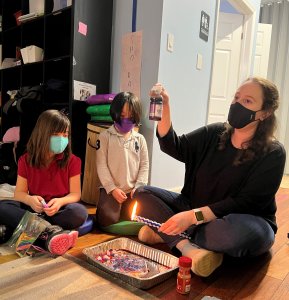
Shorashim (1st-2nd graders) started out the week with a silly story called, “The Day The Babies Crawled Away” by Peggy Rathmann. Before the story, we thought about what it meant to be an upstander versus a bystander. Learners agreed that they would rather be an upstander but recognized that there are certain situations when they feel unsafe to physically intervene in a situation but could tell a grown up instead.
Kids thought of a time when someone was a bystander or an upstander:
- When my classmate stopped another kid from hurting me.
- My sister was a bystander when someone was being bullied she didn’t do anything and it made me mad.
- When a kid looked like they were going to hit somebody, I jumped in the middle to stop it.
After listening to the story, kids reflected that the boy in the story who saves the babies was an upstander because he noticed them crawling away when no one else did. He decided to save the babies. Alternatively, if the boy saw the babies crawling away when no one else did and STILL did nothing, then he would be an example of a bystander.
After hearing the next bit of text for this week, learners reflected that Miriam could be an example of both an upstander and a bystander. She’s a bystander when she is watching Moshe in the Nile from afar and is an upstander when she suggests her mother, Yocheved, to be the babies nurse. Kiddos also thought that Batya, Pharaoh’s daughter, could be an upstander by deciding to adopt Moshe.
Kiddos empathized with Yocheved and how difficult it must have been to give up her child, then get her child back to nurse him, and then have to give it back again. Kiddos reflected that when faced with an emergency or tough situation, it can be difficult to make a quick decision.
The next day, we gave learners a few scenarios:
- Two kids on the playground, Kid A steals Kid B’s ball. Kid B is mad and charges over to Kid A and….
- What feelings is Kid B having in their body?
- Mad and sad.
- What are things kid B could do?
- Ask for the ball back.
- as the kid if they want to play.
- What feelings is Kid B having in their body?
- Kid A is playing with blocks and kid B needs those blocks for a game they’re playing. Kid A doesn’t want to give the blocks and Kid A calls Kid B a poopy face and then kid b hits kid a.
- What could Kid B do instead of hitting Kid A?
- Take a break.
- Use kind words.
- Talk to a grown up.
- What could Kid B do instead of hitting Kid A?
- When Moshe struck the taskmaster; was there a different way Moshe could have reacted differently?
- Use his words.
- Trickery.
Kids all around felt that everyone does bad things but can still be good people, also, that Moshe would have benefited from using his words instead of just reacting.
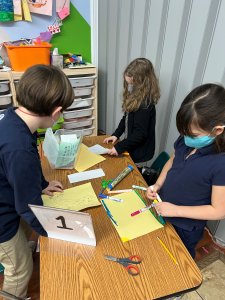
This week, Nitzanim (3rd-5th graders) explored the events of this story and how they connect to how we became Jewish people took many forms! One way Nitzanim did this was to imagine the inner monologue of some of the characters. Kiddos took turns acting out their interpretations of what was going on in the minds of characters like Yocheved, Moshe’s mother, when she sent him down the Nile in a basket, and Batya, the Pharaoh’s daughter, who took Moshe in.
Here were some reflections:
- Yocheved felt scared and sad when sending Moshe down the river.
- Yocheved may have been thinking “oh my god I can’t believe I’m doing this”.
- Batya felt a little hesitant.
Nitzanim also enjoyed a documentary that followed archeologists studying ancient Egyptian artifacts, people, and buildings from around the time Exodus was supposed to have taken place.
We took a look at the part of the story in which adult Moshe intervened upon finding a Mitzri (Egyptian) taskmaster abusing an Ivri (Hebrew) slave, and later on intervened between two Ivrim (Hebrews) fighting. Using legos and natural building blocks, we imagined how the different characters might have been feeling. Some creations included:
- A cage/jail made out of wood pieces as an imagined consequence for Moshe.
- A wooden figure to represent Moshe with a thought bubble made out of rocks to represent Moshe imagining his own consequences.
- A sad face made out of rocks.
As we explored the next portion of the story in which Moshe confronts two Ivrim (Hebrews) arguing, we rolled a giant, foam, 12-sided die to answer questions about what took place. Kiddos had some fascinating ideas about this tex:
What is one thing Moshe could have said to the Ivrim to help them resolve their conflict?
- Hi bruh, be like, nice bruh.
- Use your words!
What is one thing Moshe could have done instead of running away from the Pharaoh?
- Well, here’s an EXPLANATION of what I did.
- Made a deal with Pharaoh to be a servant instead of dying.
- He could have led a revolution.
Nitzanim continues to guide our conversations in fascinating directions.
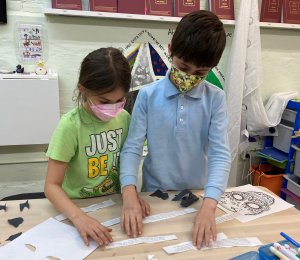
We are curious to see what kiddos will think of the next bit of the story! Tune in to see what happens!
